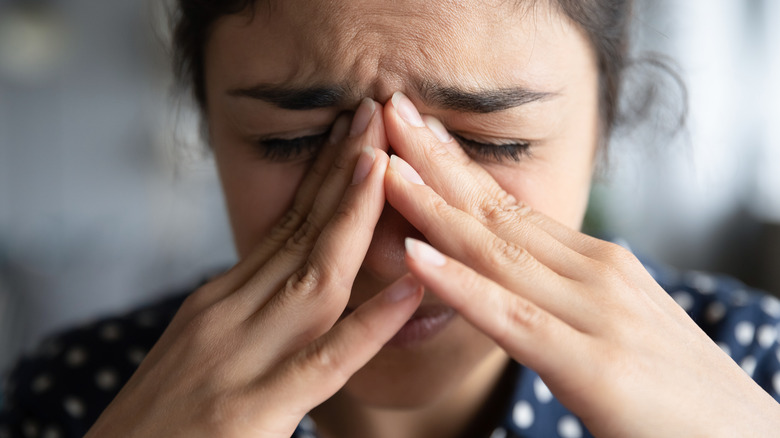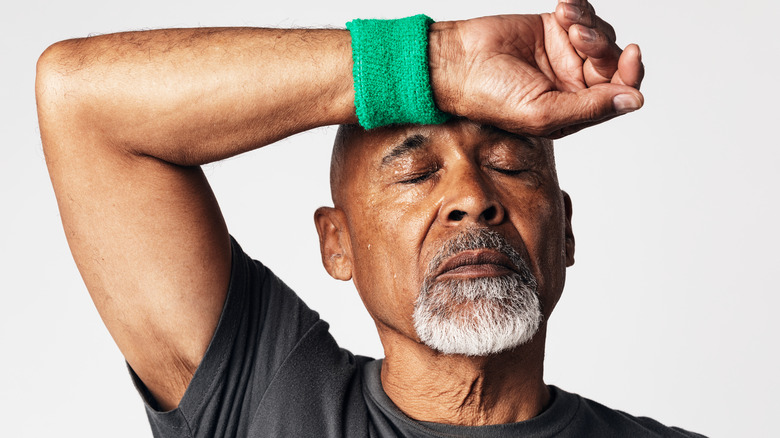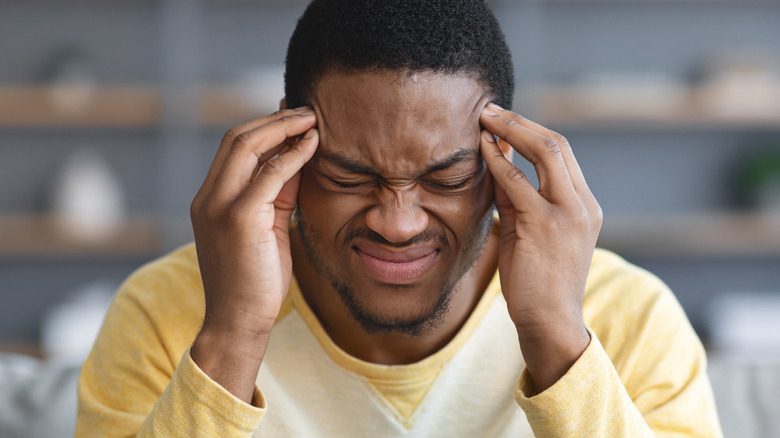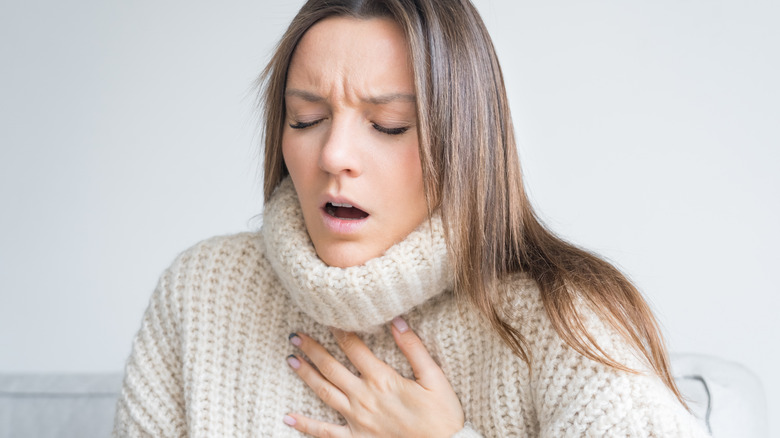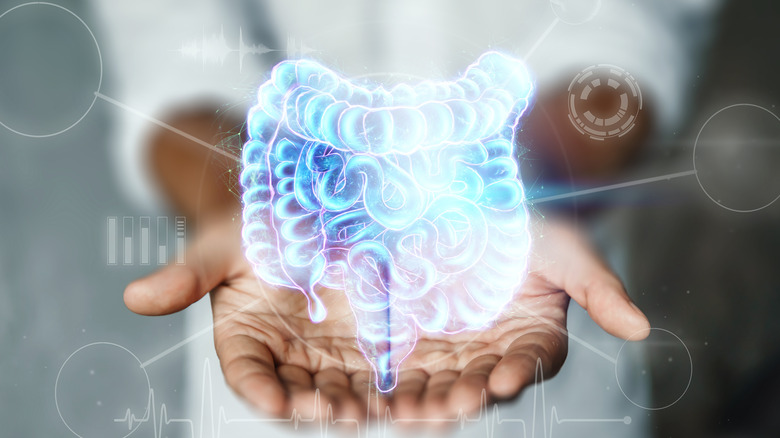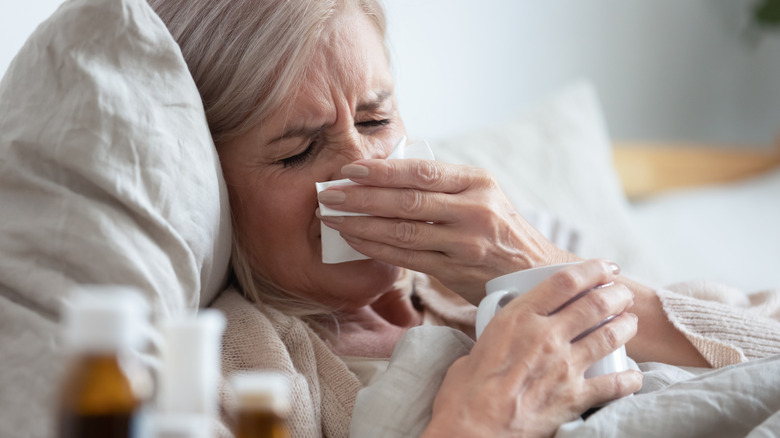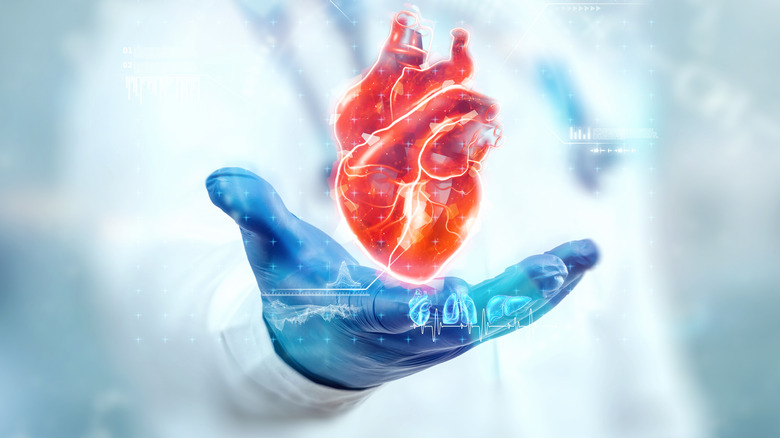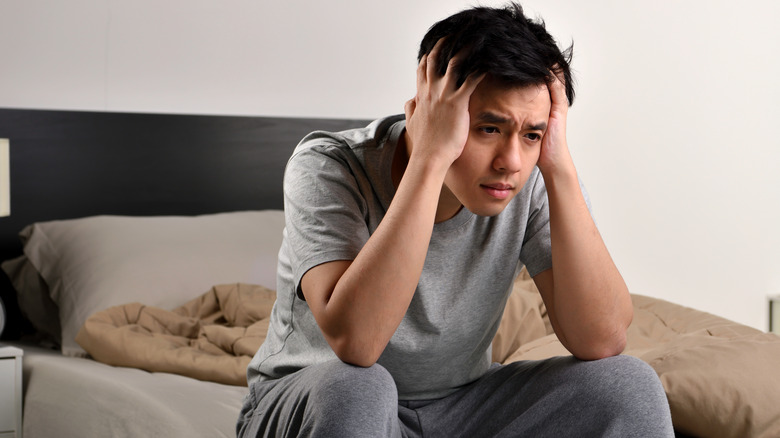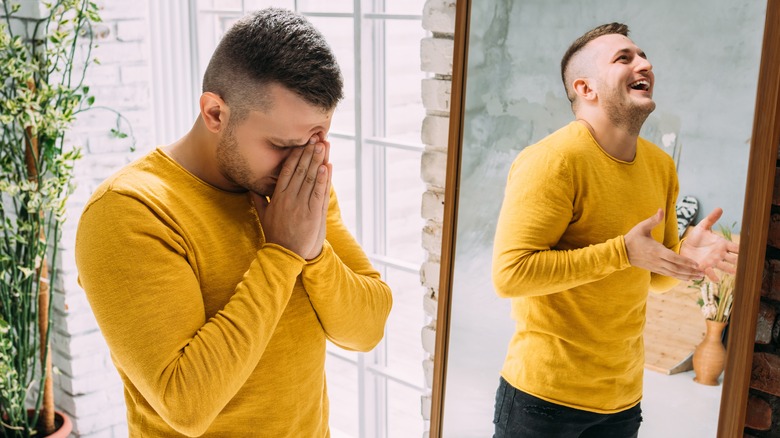The Real Effects Anxiety Has On Your Body
When we think of anxiety, we may think of a lot of things: fear, worry, obsessive thoughts, depression, fatigue, etc. Most of all, we probably think of stress. Anxiety and stress are very much related, but they are distinct states. The word anxiety comes from a Latin word meaning "apprehensive uneasiness," per the Merriam-Webster Dictionary. Meanwhile, stress is typically defined as an organism's response to an external pressure or challenge. The stress response may include feelings of anxiety, but it doesn't have to. The Encyclopedia Britannica notes that the stress response is meant to help us prepare for and cope with danger (known as adaptive stress). By contrast, maladaptive stress — or distress — refers to a stress response that does more harm than good. This is almost always the kind of stress we talk about colloquially.
The American Psychological Association claims that the difference between stress and anxiety is the presence or absence of an external stressor. We may experience stress while dealing with various stressors, but once those stressors go away, lingering feelings of stress are more likely to be referred to as anxiety. Of course, the stressors may not go away, or they may return, creating long-term stress and anxiety.
Chronic stress and anxiety are both correlated with numerous other health conditions. Repeatedly triggering the stress response, via an external stressor or simply one's own anxious thoughts, is known to have devastating consequences on the body. In short, we're not built to handle constant stress.
The effects of short-term and long-term anxiety are different
A study from Frontiers in Neuroendocrinology draws a clear distinction between short-term and long-term stress. While long-term stress is known to wreak havoc on our overall health, short-term stress can be beneficial when appropriate to a given situation. The researchers explain that the stress response has anti-inflammatory effects and can boost immune system function. It also inhibits digestion and relaxation. When confronting a genuine stressor, these are all good things. Adrenaline and cortisol help keep us energized and focused while dealing with the stressor.
The researchers also note the irony that while short-term stress is anti-inflammatory, long-term or chronic stress can create inflammation. Chronic stress can attenuate the stress response, and it also makes it difficult for us to rest and recover, further exacerbating the stress response in future situations.
Chronic stress sets the stage for chronic anxiety, but chronic anxiety can also result from past stressors that have since gone away. The effects of incredibly stressful situations can linger long after those situations are over (as in post-traumatic stress disorder). Psychology classifies long-term anxiety into a variety of disorders, e.g. generalized anxiety disorder, social anxiety disorder, phobia disorders, and a few others (via the NIH). Any prolonged anxiety could potentially be an anxiety disorder, and such diagnoses can be helpful for the purposes of finding the right treatment. Talk to your healthcare provider if you believe you may have an anxiety disorder.
Anxiety activates the emergency response of the central nervous system
Stress activates the sympathetic nervous system, triggering the fight-or-flight response (per the Center for Clinical Interventions). This is essentially the body's emergency response, and activating it can be a good thing when we're confronted with a stressor.
However, the fight-or-flight response can also be activated in the absence of a stressor. Feelings of anxiety can activate the sympathetic nervous system, causing our bodies to go into emergency mode when there's no real emergency. This can happen when remembering a past trauma or worrying about the future, or simply thinking of anything that makes you feel anxiety.
By contrast, the parasympathetic nervous system activates the rest-and-digest response, as explained in a study from Frontiers in Neuroendocrinology. The researchers suggest that the fight-or-flight response consumes a lot of energy, while the rest-and-digest response allows us to restore our energy. The two systems must work in concert with each other for optimal health. When chronic anxiety regularly triggers the fight-or-flight response in the absence of a stressor, this inhibits the rest-and-digest response. It's easy to see how this can cause harm. Our energy is constantly being consumed by false alarms, and we're not able to restore it.
Early life stress can alter brain serotonin and create chronic anxiety
When we experience trauma, the effects can last for years, even decades. Adverse events in childhood are known to correlate with negative outcomes in adulthood. A systematic literature review from Tijdschrift voor Psychiatrie found strong correlations between early childhood traumas and anxiety disorders later in life.
Another study from the International Journal of Neuropsychopharmacology discusses how early life stress alters brain chemistry and sets the stage for later life anxiety. The researchers explain that even mild early life stress can decrease cell reproduction in the hippocampus (involved in memory and learning), weaken the function of the amygdala (involved in processing emotions), and lead to a deficiency of serotonin. In other words, early life stress alters our brain chemistry so as to prepare us for a more stressful world. Our stress response becomes overactive and can cause chronic anxiety.
Thankfully, the effects of early life stress and trauma don't have to be permanent. Therapy for childhood trauma can be very helpful in disrupting and changing old thought patterns, according to Healthline. Many types of therapy can help: Some are focused on retraining physical patterns, such as eye movement desensitization and reprocessing (EMDR) therapy (via a study from the Permanente Journal). Others focus on processing and regulating thoughts and emotions, such as narrative exposure therapy (via a study from Frontiers in Psychiatry). Different therapies work for different people.
Acute anxiety can alter physical movement and performance
Feelings of anxiety can have a direct impact on our physical performance of a variety of tasks. A study from the Quarterly Journal of Experimental Psychology looked at the effects of anxiety on the performance of scaling a climbing wall. Two different groups were tested on two identical climbing walls at two different heights. The researchers theorized that the higher wall would provoke more feelings of anxiety than the lower wall, and they found that participants on the higher wall moved more slowly, held the climbing holds longer, and spent more time deliberating on the best path.
The effect isn't limited to rock climbing gyms. A study from Anxiety Research found that feelings of anxiety could affect running performance. Anxiety-inducing conditions while running caused participants' heart rates to increase more than running alone and affected other physiological biomarkers as well. While running performance was hindered for some, the researchers found an inverted-U shape among the group of participants without a history of chronic anxiety, meaning participants in this group with low or moderate anxiety conditions actually improved their running performance.
The Inverted-U Theory is also known as Yerkes-Dodson law, named after the researchers who discovered it (per Healthline). The idea is that low levels of stress appropriate to a given situation can improve performance, but too much stress can hinder it. This naturally applies to running, i.e. the "flight" of the fight-or-flight response.
Anxiety creates muscle tension
One of the most noticeable effects of anxiety on our bodies is an increase in muscle tension. A study from Journal of Neurology, Neurosurgery, and Psychiatry asserts that anxiety is associated with muscle overactivity, particularly in the neck muscles. Feelings of anxiety can trigger muscle tension in the neck, scalp, and back, creating headaches and body aches.
The researchers of the Journal of Neurology, Neurosurgery, and Psychiatry study measured muscle tension using an electromyograph in 30 participants and found that those who had high self-reported levels of anxiety had more muscle tension than those who didn't. Furthermore, they noticed that complaints about aches or pains in a specific part of the body were associated with increased muscle tension in those parts of the body.
As stress activates the fight-or-flight response of the sympathetic nervous system (via the Center for Clinical Interventions), it makes sense that it would cause muscle tension. Muscle tension is a reflex to protect us from injury, according to the American Psychological Association. For instance, if you're about to be hit, you might tense your muscles to lessen the impact of the blow. This matters during an actual fight, but when feelings of anxiety are triggered outside this context, any accompanying muscle tension likely does more harm than good.
Anxiety can cause headaches and migraines
A study from the Journal of Neurology, Neurosurgery, and Psychiatry found that participants who complained of headaches or body aches had muscle tension in the specific areas they identified as causing pain. For instance, those with headaches had a high level of tension in their scalp. This is known as a tension headache, and according to Johns Hopkins Medicine, it is the most common type of headache.
The Johns Hopkins Medicine article further notes that "muscle contractions in the head and neck are considered a major factor in the development of a tension headache," and that this can happen as a result of stress. Medicine LibreTexts explains that muscle contraction is characterized by muscular tension (and not necessarily by a shortening of the muscle, which is a popular misconception). In other words, anxiety can create muscle tension and contraction in the scalp, and this can lead to tension headaches.
The Mayo Clinic suggests that headaches and migraines are common symptoms of generalized anxiety disorder (GAD), a disorder characterized by persistent feelings of anxiety. A study from the Journal of Headache and Pain also found primary headaches to be much more prevalent among those with GAD than those without GAD. Primary headaches refer to any headache caused by overactivity in the muscles rather than an underlying condition (per the Mayo Clinic).
Anxiety alters respiratory function
A direct effect of anxiety on our bodies is an increase in breathing rate. Anxiety triggers the fight-or-flight response of the sympathetic nervous system (via the Center for Clinical Interventions), and elevated breathing is a key part of this: It helps bring more oxygen into the body, theoretically preparing us to fight or flee. A study from the International Journal of Psychophysiology found both mental and physical stress to increase the respiratory rate of the study participants.
Breathing too rapidly, also known as hyperventilation, can cause problems of its own (via Johns Hopkins Medicine). Breathing is a two-step process: inhaling oxygen and exhaling carbon dioxide. Hyperventilation can remove too much carbon dioxide from the blood, causing a variety of complications. Dizziness, lightheadedness, weakness, and confusion are all symptoms of hyperventilation.
By contrast, controlled deep breathing is known to trigger the relaxation response, according to Harvard Health. In addition to promoting relaxation, breathing exercises can also help to alleviate anxiety. Controlled breathing techniques have been found to improve anxiety and depression in hospital-bound patients with chronic obstructive pulmonary disease, via a randomized controlled trial from Respiratory Care. Another study (via Cognition and Emotion) found that young children who took deep breaths before a math test performed better than those who didn't, suggesting that the technique can help treat test or performance anxiety.
Anxiety disrupts digestive function
Anxiety inhibits the rest-and-digest response of the parasympathetic nervous system, according to a study from Frontiers in Neuroendocrinology. The authors explain that when we're under stress, digestive function is compromised because "digestion can wait." As a result, chronic stress and anxiety can lead to chronic digestive issues. A study from the Journal of Clinical Psychiatry found irritable bowel syndrome (IBS) more prevalent among those with chronic anxiety.
Another study from the Scandinavian Journal of Gastroenterology found anxiety to be associated with heartburn, diarrhea, constipation, and nausea. The researchers note that depression was also associated with all four of these symptoms, but the association was not as strong as it was with anxiety.
It makes sense that gastroenterological symptoms could be caused by stress disrupting the functioning of the digestive system, but this isn't the only avenue through which anxiety can create stomach problems. As explained by Harvard Health, the gastroenterological tract is sensitive to our emotions, and it is also where we often seem to feel them (hence the expression "gut feeling"). Signals between the intestines and the brain can go both ways, so gastrointestinal distress can trigger anxiety just as anxiety can trigger gastroenterological distress. It's also possible for both to happen at once, creating a vicious cycle wherein anxiety causes stomach problems and stomach problems cause additional anxiety.
Chronic anxiety can weaken the immune system
Short-term stress can boost immune function (via a study from Frontiers in Neuroendocrinology), causing our bodies to produce certain types of white blood cells. In theory, this could be to help us recover from any injuries or prevent infections that might have happened as a result of combating the stressor.
However, chronic stress and anxiety weaken immune function. As explained by the Cleveland Clinic, having too much cortisol (the "stress hormone") in your blood can cause the cortisol to become less effective, leading to a decrease in white blood cells. Additionally, when the immune system is constantly activated by the stress response, it becomes overworked and is no longer able to function properly, thus weakening it.
According to Healthline, chronic anxiety impairs the immune system, leaving you more susceptible to infections from viruses and bacteria. It may even make regular vaccines less effective. Vaccines work by triggering our immune response, giving our white blood cells a small sample of deactivated virus or bacteria so they can create the right antibodies for this virus or bacteria. If our immune system is compromised due to chronic stress, we may not be able to produce the same number of antibodies as we normally would when given a vaccine, diminishing the effect of the vaccine and leaving us more vulnerable to disease.
Anxiety can increase the risk of cardiovascular disease
Anxiety has a direct impact on our cardiovascular system. According to the Cleveland Clinic, stress activates the fight-or-flight response, increasing our heart rate and potentially causing heart palpitations. In addition, stress hormones also cause a temporary rise in blood pressure (via the Mayo Clinic). As the CDC explains, high blood pressure can weaken our arteries, and it also increases our risk of heart attack, heart disease, and stroke.
Stress has immediate effects on our cardiovascular system, and chronic stress can exacerbate these effects. An article from the American Journal of Hypertension states that cardiovascular disease is known to be associated with numerous psychological conditions, including stress and anxiety. Additionally, a meta-analysis from the Scandinavian Journal of Work, Environment, and Health found that work stress could increase the risk of cardiovascular disease by 50%. Another meta-analysis from the Journal of the American College of Cardiology found anxiety to be an independent risk factor for developing heart disease.
In a review from the Annals of Physical and Rehabilitation Medicine, the researchers point to a strong association between cardiac events (e.g. heart attacks) and anxiety, and they advocate for including an evaluation of anxiety and depression as part of a rehabilitation program for patients recovering from cardiac events.
Anxiety is associated with insomnia
As anxiety inhibits the rest-and-digest response of the parasympathetic nervous system (via a study from Frontiers in Neuroendocrinology), it interferes with our ability to rest and sleep. A study from Sleep Medicine Clinics found insomnia to be correlated with anxiety. The stress response seems to induce a state of "hyperarousal," making sleep very difficult if not impossible. More specifically, the ruminations associated with feelings of anxiety (which can be a direct result of the stress response) inhibit relaxation, making it harder to "shut off" the mind in order to fall asleep. Research from The Division of Sleep Medicine at Harvard Medical School shows that even short-term sleep deprivation can impair mood, memory, and the ability to learn, and it can even increase the risk of injury.
Another study from Sleep indicates there is a close connection between insomnia, anxiety, and depression. People with insomnia had higher levels of both anxiety and depression than people without insomnia. As explained by the Anxiety and Depression Association of America, the causal direction can go both ways. Anxiety can cause sleep problems, but sleep problems can also cause anxiety, potentially creating a vicious cycle. When dealing with a sleep disorder, it's crucial to treat any underlying anxiety, or any anxiety that surfaces as a result of poor sleep.
Anxiety can create feelings of social isolation
A study from the American Psychological Association suggests anxiety can cause people to become socially isolated. While fear was found to increase the need for social affiliation, anxiety was found to have the opposite effect. This is in contrast to prior research, which had concluded that people would feel a need to compare their emotions against those of others in response to any strong emotion, thus creating a need for social affiliation. By contrast, anxiety seemed to create a need to withdraw.
Another study from Development and Psychopathology looked at the relationship between anxiety and social withdrawal, finding that feelings of anxiety could predict social withdrawal among teenagers. Interestingly, the researchers noted that a bidirectional relationship between social withdrawal and anxiety had been hypothesized but wasn't supported by the evidence. In other words, feelings of anxiety could lead to social withdrawal, but social withdrawal didn't seem to lead to additional anxiety.
However, that does not mean social withdrawal doesn't have consequences of its own. According to WebMD, social withdrawal can be both a symptom and a cause of depression. While depression is a very different state from anxiety, the two are in fact related. For instance, anxiety might lead to depression by way of social withdrawal.
Anxiety correlates with depression
Anxiety is a state of hyperarousal, while depression is a state of low arousal. The American Psychiatric Association explains that depression is characterized by a sad mood, a loss of energy, an inability to take pleasure in enjoyable activities, and difficulty concentrating (among other things). Overall, it can create feelings of lethargy — quite the opposite of the feelings induced by the stress response.
Anxiety and depression might feel very different, but they are closely associated with one another. A study from Clinical Psychology Review argues that it doesn't make sense to study anxiety and depression in isolation from one another, and that research about anxiety or depression needs to measure both variables separately.
As explained by the Mayo Clinic, there is a bidirectional relationship between depression and anxiety. Depression can be a symptom of an anxiety disorder, but anxiety can also be a symptom of clinical depression. It's common to have diagnoses of both anxiety and depression. The Mayo Clinic also points out that treatments for both conditions are very similar, including psychological counseling and medications. Additionally, since anxiety and depression are correlated with each other and have similar treatments, treating one condition may improve the other condition as well.
If you or someone you know is struggling with mental health, please contact the Crisis Text Line by texting HOME to 741741, call the National Alliance on Mental Illness helpline at 1-800-950-NAMI (6264), or visit the National Institute of Mental Health website.
Chronic anxiety can be treated
Chronic anxiety has many negative effects on our bodies, but thankfully, it can be treated. The Mayo Clinic lists both psychotherapy and medications as possible treatments of a variety of anxiety disorders, and they point out that combining both approaches may work better than either approach alone. However, note that people respond differently to different medications, and some may experience unpleasant side effects (via Healthline).
For those who would prefer to avoid medication (or who want to supplement it with additional treatment), a variety of other natural treatments are known to alleviate anxiety. For instance, physical activity has been shown to reduce anxiety, according to a study from Frontiers in Psychiatry. Research from Johns Hopkins Medicine suggests that mindfulness meditation can be beneficial not just for treating anxiety, but for symptoms of pain as well. Additionally, controlled breathing can help trigger the relaxation response and calm anxiety (via Harvard Health). Herbal therapies (such as herbal tea) can also help to reduce anxiety, per Healthline. Some of the best herbs for anxiety include chamomile, lavender, valerian root, lemon balm, and ashwagandha, all of which have been clinically studied.
When it comes to treating anxiety, multiple approaches can be beneficial, but everyone will respond differently to different approaches. Talk to your healthcare provider if you have chronic anxiety so you can determine the best treatment plan for you.

